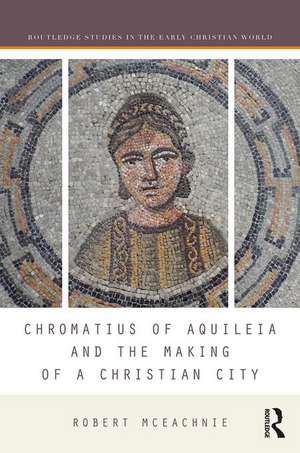Chromatius of Aquileia and the Making of a Christian City: Routledge Studies in the Early Christian World
Autor Robert McEachnieen Limba Engleză Hardback – 23 iun 2017
| Toate formatele și edițiile | Preț | Express |
|---|---|---|
| Paperback (1) | 258.50 lei 6-8 săpt. | |
| Taylor & Francis – 14 aug 2020 | 258.50 lei 6-8 săpt. | |
| Hardback (1) | 765.01 lei 6-8 săpt. | |
| Taylor & Francis – 23 iun 2017 | 765.01 lei 6-8 săpt. |
Din seria Routledge Studies in the Early Christian World
-
 Preț: 279.03 lei
Preț: 279.03 lei -
 Preț: 311.41 lei
Preț: 311.41 lei -
 Preț: 311.07 lei
Preț: 311.07 lei -
 Preț: 312.97 lei
Preț: 312.97 lei -
 Preț: 382.87 lei
Preț: 382.87 lei -
 Preț: 409.25 lei
Preț: 409.25 lei -
 Preț: 378.22 lei
Preț: 378.22 lei -
 Preț: 383.13 lei
Preț: 383.13 lei -
 Preț: 376.14 lei
Preț: 376.14 lei - 17%
 Preț: 258.50 lei
Preț: 258.50 lei -
 Preț: 383.13 lei
Preț: 383.13 lei -
 Preț: 388.44 lei
Preț: 388.44 lei -
 Preț: 383.13 lei
Preț: 383.13 lei -
 Preț: 383.13 lei
Preț: 383.13 lei - 16%
 Preț: 261.73 lei
Preț: 261.73 lei - 24%
 Preț: 787.71 lei
Preț: 787.71 lei -
 Preț: 381.27 lei
Preț: 381.27 lei
Preț: 765.01 lei
Preț vechi: 1027.88 lei
-26% Nou
Puncte Express: 1148
Preț estimativ în valută:
146.45€ • 150.62$ • 121.50£
146.45€ • 150.62$ • 121.50£
Carte tipărită la comandă
Livrare economică 19 februarie-05 martie
Preluare comenzi: 021 569.72.76
Specificații
ISBN-13: 9781138221444
ISBN-10: 1138221449
Pagini: 204
Dimensiuni: 156 x 234 x 17 mm
Greutate: 0.5 kg
Ediția:1
Editura: Taylor & Francis
Colecția Routledge
Seria Routledge Studies in the Early Christian World
Locul publicării:Oxford, United Kingdom
ISBN-10: 1138221449
Pagini: 204
Dimensiuni: 156 x 234 x 17 mm
Greutate: 0.5 kg
Ediția:1
Editura: Taylor & Francis
Colecția Routledge
Seria Routledge Studies in the Early Christian World
Locul publicării:Oxford, United Kingdom
Cuprins
Introduction
1 Roman Aquileia: Where Trade and Pluralism Reigned
2 Chromatius: Patron, Peacemaker, Politician, and Preacher
3 Memories of the Past: Arians, Aquileia, and Authority
4 "Unlike in Tongue, Unlike in Dress or Arms?": The Place of Barbarians in a Christian World
5 "An Abandoned Nest": Jews in Aquileia
6 Writing in Stone: A Synagogue, Churches, and Changing Donation Patterns
7 Adapting Roman and Christian Ideals: Values for a New Elite
Conclusions: Intolerance and the "Christian" City
Bibliography
Index
1 Roman Aquileia: Where Trade and Pluralism Reigned
2 Chromatius: Patron, Peacemaker, Politician, and Preacher
3 Memories of the Past: Arians, Aquileia, and Authority
4 "Unlike in Tongue, Unlike in Dress or Arms?": The Place of Barbarians in a Christian World
5 "An Abandoned Nest": Jews in Aquileia
6 Writing in Stone: A Synagogue, Churches, and Changing Donation Patterns
7 Adapting Roman and Christian Ideals: Values for a New Elite
Conclusions: Intolerance and the "Christian" City
Bibliography
Index
Notă biografică
Robert McEachnie is lecturer of the ancient world in the History Department at the University of North Carolina at Charlotte, USA. His research focuses on late antique transformations of culture along religious lines and has been published in Church History, Revue des Études Tardo Antiques, and several edited volumes.
Recenzii
Chromatius of Aquileia and the Making of a Christian City is a welcome and refreshing departure from the usual type of publication on social and religious transformations in the fourth century. By placing Chromatius and his rhetorical constructs at the centre, a colourful and gripping study of Aquileia and its inhabitants is born. This is indeed a thrilling tale of a bishop with a mission. The author narrates with originality and verve how Chromatius conquered the hearts and minds of this contemporaries, changed patterns of gift giving, and increasingly shaped the city to a Christian ideal.
- Dr Ine Jacobs, The Ioannou Centre for Classical and Byzantine Studies, Oxford University, UK
- Dr Ine Jacobs, The Ioannou Centre for Classical and Byzantine Studies, Oxford University, UK
Descriere
Chromatius of Aquileia and the Making of a Christian City examines how the increasing authority of institutionalized churches changed late antique urban environments. Aquileia, the third largest city in Italy during late antiquity, presents a case study in the transformation of elite Roman practices in relation to the urban environment. Through the archaeological remains, the sermons of the city’s bishop, Chromatius, and the artwork and epigraphic evidence in the sacred buildings, the city and its inhabitants leave insights into a reshaping of the urban environment and its institutions which occurred at the beginning of the 5th century. The words of the bishop attacking heretics and Jews presaged a shift in patronage by rich donors from the city as a whole to only the Christian church. The city, both as an ideal and a physical reality, changed with the growing dominance of the Church, creating a Christian city.
